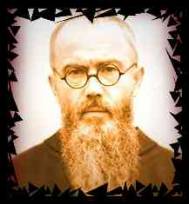|
Born at Zdunska Wola (near Lodz), Poland, in 1894; died at Auschwitz
(near Cracow), August 14, 1941; beatified by Pope Paul VI in 1971; canonized
in 1982 by Pope John Paul II.
"Pray that my love will be without limits." --Saint Maximilian Kolbe in his last letter to his mother.
Maximilian studied in Rome, where he was ordained in 1919. Upon being diagnosed with tuberculosis, he returned to Poland and took up the teaching of ecclessial history in a seminary. After he came close to dying of the disease, he became even more zealous. He founded a militant sodality and a magazine of apologetics for Christians. When he moved the antiquated presses from Cracow to Grodno circulation increased to 45,000. New machinery was installed, which was run solely by priests and lay brothers. Following another attack of tuberculosis, Maximilian re-established the presses near Warsaw at Niepokalanow. Here Kolbe founded a Franciscan community that combined prayer, poverty, and the production of a daily and weekly newspaper using the latest technology. As unlikely as it may seem, Kolbe's next act was the founding of a Franciscan community at Nagasaki, Japan. In 1936, he was recalled to Niepokalanow as the superior over 762 friars. When the Germans invaded Poland in 1939, Kolbe sent most of the brothers home with the warning that they should not join the underground resistance. Those that remained were interned, released, and returned to the monastery, which had become a refugee camp for 3,000 Poles and 1,500 Jews. The remaining friars continued to publish newspapers critical of the Third Reich. In 1940, the Nazis established a concentration camp at Oswiecim in southern Poland--Auschwitz. Prisoner #16670, a Catholic priest named Maximilian Kolbe, who had refused German citizenship, was arrested on February 17, 1941, on the charge that he was a journalist, publisher, and intellectual. The Gestapo officers who seized Maxilian and four other brothers were amazed at how little food was prepared for the brothers. They were sent to Auschwitz in May 1941. Priests in Auschwitz were especially vilified. They were given the job of moving loads of logs and were beaten when their strength gave way under the heavy work. One of the savage guards once horsewhipped Kolbe 50 times and left him for dead in a wood. The saint recovered some of his strength, and continued to comfort his fellow prisoners, insisting that everything, even sufferings, came to an end, and the way to glory was through the cross. Father Kolbe also undertook the task of moving the bodies of the tortured. Throughout his internment, he continued his priestly ministry: hearing confessions in unlikely places and smuggling in bread and wine for covert Masses. He was conspicuous for his compassion towards those even less fortunate than himself. One day a prisoner escaped, which meant that men from the same bunker must be selected to die. In reprisal the prison guards chose ten men, whom they planned to starve to death. One was a married Polish sergeant named Francis Gajowniczek. Maximilian Kolbe begged the camp commandant to let him take Gajowniczek's place, "I am a Catholic priest. I wish to die for that man." The request was granted. "I am," argued the 47-year-old priest, "old and useless; he has a wife and children" Maximilian Kolbe comforted each one in the death chamber of Cell 18 as they prepared to die with dignity by prayers, Psalms, and the example of Christ's Passion. Two weeks later only four were left alive and Maximilian alone was still fully conscious. His guards could scarcely bear the saint's composure, and they speeded his end by injecting him with phenol. Although Maximilian Kolbe had been a brilliant scientist, mathematician, and religious journalist, he is remembered for this last act of charity. Kolbe was epitomized the Polish religious and the many unsung heroes of the concentration camps. Pope John Paul II, previously archbishop of Cracow, canonized Father Kolbe in the presence of the sergeant whose life had been saved (Bentley, Farmer). |
 Photo
courtesy of Ave Maria Institute and MaxKol
Photo
courtesy of Ave Maria Institute and MaxKol